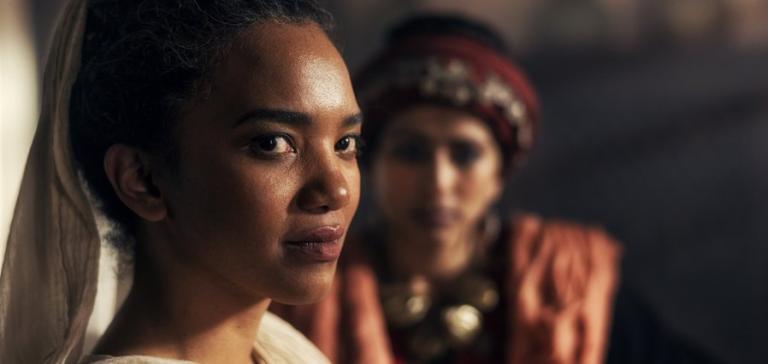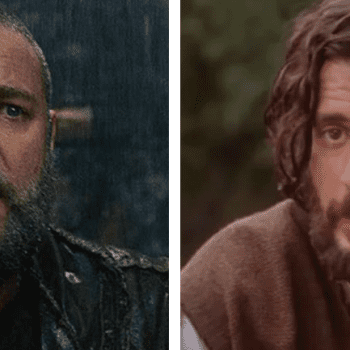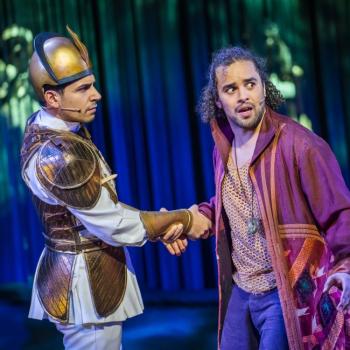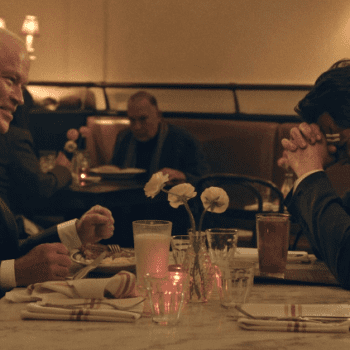One of the many noteworthy things about A.D. The Bible Continues is the way it emphasizes the connections within the New Testament by drawing several characters from the gospels into the events of the book of Acts. Another is the way it focuses on the role played by the women of that era.
Thus, one of the show’s most important characters is Mary Magdalene, the “apostle to the apostles” who told the disciples that Jesus was risen before the disciples had witnessed the Resurrection for themselves. Mary Magdalene is never mentioned by name in the book of Acts, but A.D. depicts her as one who is actively involved in the early Christian community, and along the way she personally participates in such pivotal events as the burial of Stephen and the conversion of Cornelius.
The series also underscores her relationship with Joanna, another woman who is mentioned in the gospels but not in Acts, and it suggests that both Mary and Joanna might have known Tabitha, who is mentioned in the book of Acts only.
Mary Magdalene is played in the series by Chipo Chung, an actress of Zimbabwean and Chinese descent who was born in Tanzania and is now based in London, England. Chung’s credits include films like Sunshine and In the Loop, as well as TV shows like Sherlock and Doctor Who.
I spoke to Chung by phone this week while she was visiting relatives in Canada.
–
When you guys were shooting A.D. in Morocco last year, I was in Morocco myself for a week to visit the set of Killing Jesus.
Chung: Oh yeah! Why didn’t you come visit us?
I wanted to, but you were in a different studio or something.
Chung: We were the competition.
Well exactly, yes. The publicists for the one movie were dedicated to that movie, so there you go. But I saw your call sheets on the hotel lobby desk every morning.
Chung: (laughs) Yeah, well, it’s great. We actually had a very collegiate relationship with the Killing Jesus guys. In fact, a couple of the actors were in Killing Jesus and A.D., there are a few people who crossed over; and of course Haaz Sleiman, who played Jesus [in Killing Jesus], is one of my very close friends.
Yeah, I read about that, that apparently the two of you arranged some sort of camel ride or something?
Chung: (laughs) Really? Yeah, well, I actually went out to the desert with mainly the Killing Jesus crew.
Haaz is one of my best friends and we went on a seven-hour drive, and hilariously, while we were there, we bumped into Juan Pablo di Pace, who was my Jesus, so I then landed up spending a night in the desert camping with Juan Pablo — which was very funny, because he had gone off on this mission by himself to go find solitude, like Jesus, and go to the desert before he started shooting, and he lands up at the Auberge on the outskirts of the desert, and there are these 15 guys from Killing Jesus and me! (laughs) It was pretty funny.
So anyway, I swapped teams and went with my Jesus in the end.
Oh, you defected. Okay.
Chung: No, yeah, no, I was friends with everybody. We had an amazing time out there.
And if you don’t mind my asking, I’ve heard that there was also a Mary Magdalene swimsuit competition? Does that ring a bell? Is there any truth to that?
Chung: There are no bells ringing with that one, absolutely not. There were three Mary Magdalenes [the third production shooting in Morocco at that time was CNN’s Finding Jesus], and I think they would take to task anyone who came up with– That was probably someone’s fantasy. That did not happen. (laughs) But there were three of us, different girls, all very strong and different. We definitely all hung out.
So you’re saying I can’t trust what I read in The Hollywood Reporter, then.
Chung: Oh, goodness. Really?
I think that’s where I read it, yeah.
Chung: That was some disciple’s fantasy. (laughs)
And that’s the thing, right? I mean, that has been my thing with Mary Magdalene, is she’s such an interesting character because she has been so sexualized in the history books. She is a sex object, if you look at traditional paintings and stuff, even when you see images of Mary talking to Jesus, there is this sort of earthy sexuality to the way she is always depicted, and that is just the way that men see women. That is nowhere in the Bible.
I would say that the Mary Magdalenes in all three of the different productions would probably put the guys to task — and were strong women and striking women — but we definitely were not in our bikinis for the guys. (laughs) But you see how these mythologies are created, right?
Sure, sure. Well that’s one of the things I like about your take on Mary Magdalene, and A.D.’s take on the character. I saw that on the Beyond A.D. show that you appeared on, you had some very interesting things to say about the “clues” in the gospels: the fact that she was a patron of the Jesus movement and things like that–
Chung: Which you never hear about. You just hear she was a prostitute.
Right. And there was a recent episode where Joanna gives Mary Magdalene some money “for the cause”, which I thought was a nice nod to that element in the gospels.
Chung: Yeah. It does say in the gospels that Joanna, Mary Magdalene and a number of other women supported the disciples from their own means, and that’s the Joanna, yeah.
One thing I appreciated about The Bible miniseries two years ago is that it also covered some of the book of Acts, and it had this emphasis on the continuity: all the apostles who were following Jesus during his ministry were still there afterwards, including Mary Magdalene in that series. And so now, A.D. has done that as well, by making Mary Magdalene such a prominent character in a part of the Bible that never mentions her, but presumably she was there for at least part of it.
Chung: Yeah. Well that’s the thing, you know. Saint Paul, or Saul, was a very literate man. He was very well-educated, and the Acts and many of the books of the New Testament are based on his writings, whereas I don’t think that women were all that literate at that time, so their stories weren’t written down. So some people may say that’s not in the Bible, but that doesn’t mean they weren’t present, because they certainly were.
It is interesting with her, because after episode two, the storyline of Mary is imagined. The characteristics that I use as the basis for her character — her courage, the fact that she’s strong of faith, the fact that she’s a witness to grief — you get that all from the references in the Bible that we see, so I try to keep as close to that in terms of her character, but the storyline has to be imagined.
And I do think of that, that Jesus was a storyteller and used parables to explain things, and I think it’s great that we have this format of television to illuminate and create new parables that can join up some bits of the Bible that aren’t so joined up, like you say, that bit about the fact that she and Joanna supported the disciples from their own means. So that’s the mention of it, and there’s so much that one can draw from that, so it’s great to have a form that allows one to use one’s imagination.
Some of the gospels, you may know, have multiple women going to the tomb and finding it empty — John’s gospel seems to have just Mary Magdalene there — but given that you kind of were the only female disciple for the first few episodes of the series, did you ever wish that they had brought in some of the other women earlier, instead of putting off Joanna until episode nine or whatever it was?
Chung: Well, fortunately, Greta [Scacchi, who played the Virgin Mary] was there, so that was my pal, (laughs) but it was very much like what it must have been like for Mary, being surrounded by men. I think in the original story outlines, I think Joanna came in a lot earlier, but there’s so many characters that I think they wanted to allow the viewer to have the time to get to know the ones around.
But I thought that was interesting, because I think she was a woman in a man’s world, and I got to experience that. And I think that’s why she’s largely misunderstood, because how could there have been a woman there, working with all these guys? So I like the way it’s laid out, and I do love it when the women come in, and I think they’re fantastic performers: Farzana [Dua Elahe] who plays Joanna, and Maramar [Corlett] who plays Tabitha. I think they’re both fantastic actresses.
You talked about how Mary Magdalene has been sexualized, both in tradition and elsewhere. There was a scene a few episodes ago where Caligula basically harasses you, and how did you feel about your character being treated like that on the series?
Chung: Yeah! I mean, the whole– I think the Roman world, and a lot of that is imagined as well, but that’s what I think is the most arresting thing about the series: they lived in a really violent world. When I read the Bible, I didn’t get that context, but if you read Roman history, they really were quite violent and quite vile.
Yeah, it was tough, and I imagine that was pretty close to what one would experience, and I think that’s probably how these stories came out, that imagined she was wayward. I think women have always had a pretty tough time of it, so I’m glad that was in there. I think it’s really tough to be a woman in a man’s world, and we still have a tough time in the 21st century, so two thousand years ago, I think it’s even more startling that she pops out of the Bible as this character with distinction, when it was exponentially more difficult to be a woman in that time than now.
It’s pretty bracing, because you’re used to seeing saints treated in a traditional iconographic way, and actors often talk about how the challenge is to make the characters human — and that’s one thing — but then to make them vulnerable in a way that the biblical story never requires is almost shocking in another way. It’s kind of daring to go that way.
Chung: Yeah. She’s vulnerable. I think that’s absolutely true.
And that is one of the challenges of playing these parts, is that there is one aspect of where, by being a witness to the Resurrection, all of the disciples– I mean, if you were a witness of that, in many ways you’d be forever changed, you know? There’s a certain different kind of belief that you’d have as a witness.
But at the same time, they didn’t instantly become saints, and all those who have become saints since, it’s from the work of a lifetime. And I even understand that there are many saints like Mother Teresa who have had crises of faith, and have had doubts, and have been vulnerable even in their beliefs, and have worked through them.
And that is something that I think all of us try to work with, because if a character is superhuman, how can we ever imagine that we can be better people like them? And I think being a saint, or even being a good person or a good Christian or a good human being is something that takes work every day. Just wake up and be it.
One of the things that is kind of unique about this series is how it really goes for some of the supernatural elements in the story of Acts. I’ve seen other films that were based on Acts, and they’ve tended to not emphasize things like the speaking in tongues at Cornelius’s conversion — but you do that in this series. How was it approaching scenes like that?
Chung: I love the fact that A.D. dives into that stuff, and I love the fact that it focuses minutely on these weird chapters. Like, it wasn’t just Jesus who was resurrected? I find it really compelling that at this sort of village level, these individual miracles were happening. I love it.
How does one approach it? I know that there are churches where speaking in tongues is still a big part of the practice. In some African versions of Christianity there is this line between African possession and speaking in tongues, there are these cases where that sort of possession happens. So I think it’s fascinating to bring that to life. I loved it.
Did you have, like, charismatic advisors on the set or anything like that?
Chung: I know that Mark and Roma have a lot of advisors from different churches, but no, on set, we didn’t. So it came largely from our imaginations.
But coming from Africa, I do know of Christian sects that are very much like that, and in many ways they are more kind of grassroots people in the way that the early Christians would have been. Like, when you see the scene with Tabitha, in that sort of pastoral landscape, with these villages, yeah, I do know of some African Christian sects are in a very similar environment. So in some places in the world, things haven’t changed that much.
You mentioned on Beyond A.D. that you played Mary Magdalene in high school?
Chung: Yeah, I did!
In Jesus Christ Superstar, was it?
Chung: That’s right.
So is there any B-roll footage of you singing ‘Everything’s Alright’ on the set of A.D.?
Chung: (laughs) There actually– Well, if they were smart, they could have gotten it. I am very serious on camera, but off camera, on set, I am quite humorous, so I did spend some outtakes singing from musicals. So they could have recorded it.
You know, we’re on set for very long hours, and actually all of the cast had a great sense of humour, so we did have a laugh, I guess because for me, particularly, every time I’m on screen, it’s, like, deadly serious and quite grief-stricken and mournful. It does help to have a laugh.
— Chipo Chung’s Mary Magdalene plays a major part in the last two episodes of A.D. The Bible Continues, which air on NBC over the next two Sundays (June 14 & 21).













